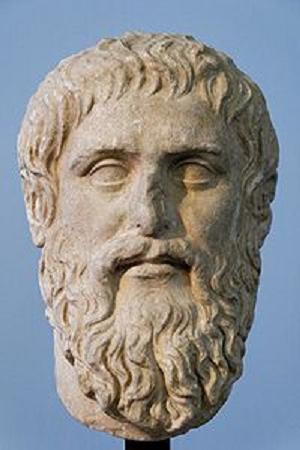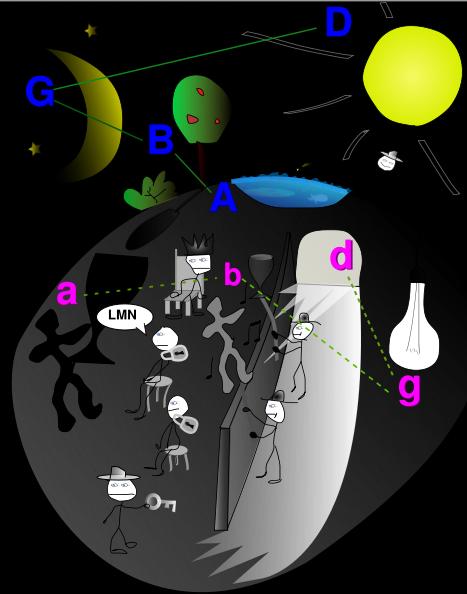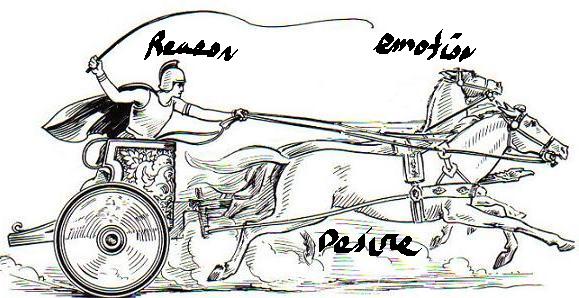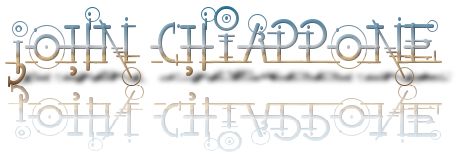|

PLATO
(428/427 BCE 348/347 BCE
Life of Plato
Plato went to Sicily after Socrates died.
Southern Italy was a part of Greece at the time.
In Sicily, he wrote most of the early dialogues, and
the first half of the Republic.
He came back to Athens, and formed the Academy.
It was in a grove (academia).
He taught there until his death (age eighty).
His most noticeable student was Aristotle.
Aristotle stayed with Plato until Plato's death.
Aristotle formed the Lyceum.
He left Athens when the Macedonians started fighting
again. Aristotle was a Macedonian.
His student was Alexander of Mascedon.
Plato wrote in the dialogue form.
He uses obviously fallacious arguments.
Socrates was consumed with social problems, moral
problems, and political problems.
Plato was a metaphysician and epistemologist.
Plato doesn't take credit for his ideas.
The
Republic
Plato (427-347 B.C.)
Metaphysical/Epistemological Abstract
1. Perceptions are unfit objects for
knowledge.
The following are true of perception:
a. Each man is
the measure of all things (Protagoras).
b. All things change
(Heraclitus).
c. They cannot be
grasped by essential definitions (Socrates).
2. Forms are proper objects of knowledge.
a. This knowledge is
absolute and infallible.
b. Forms are eternal and
unchanging (Parmenidies).
c. They exist apart from
sensible things and God (Timaeus).
d. They are not in a place.
e. They are capable of
essential definition (Socrates).
3. The Good is the proper object of wisdom.
.................................................
1. a. Sense knowledge is
relative.
3. God and the soul are Parmenidean (#380d,
381a)
THE DIVIDED LINE
|
The Good
|
WISDOM
unchanging, eternal |
Higher Forms
Lower Forms |
KNOWLEDGE
Intelligible Realm -
Rationalism
objective,
unchanging, eternal |
|
|
 |
Physical Objects
|
|
BELIEF |
|
Shadows & Reflections |
|
OPINION
Sensible
Realm -
Empiricism
particulars, spatiotemporal,
changing, temporary |
From the least
real and least knowable
to the most
real and most knowable. |
|
Forms require images to understand them. These are
things that are found in geometry, the human form
(rational animal), or the form horse. These require
our familiarity with particular circles, squares,
people or horses.
Beauty is an average.
read more
The higher forms don't require any images for us to
understand them. These are found in the realm of
pure mathematics. We cannot draw a picture of an
algebraic equation or a differential equation? All
the things philosophers concern themselves with
would belong to this realm. The form of love,
justice, beauty, goodness, and so on.
The being of one depends on the other.
Reflections depend on the reflected object.
Material objects depend upon the forms they reflect.
A
chair cannot be manufactured without a blueprint.
A
photographer makes a brochure of the chair.
If you want to know the most real, you have to raise
from the sensible to the intelligible.
In every field, we study general things - not
particulars.
The senses lead to solipsism.
Reason concludes that this is an illusion.
THE CAVE ANALOGY

The Republic
Plato (427-347 B.C.)
Political/Ethical Abstract
The # Represents
Stephanas numbers from the Platonic Dialogues.
1. Injury makes men unjust (#335).
2. Justice is giving one's due (#335e).
3. Justice is the interest of the strong
(#338).
Advanced by Thrasymachus.
Injustice is
advantageous (#343) - Gyge's ring (#359).
Counter-examples:
Rulers sometimes err.
Friends can be
unjust to each other.
4. Politics is directed towards the
citizens.

5. The soul contains reason, emotion, and
desire.
6. Justice (virtue) occurs when all three
are harmonized (#442a).
7. A state contains rulers, soldiers, and
workers.
Plato's Republic is totalitarian;
everyone should not have a say.
The worst form of government is a
democracy.
8. Justice (virtue) occurs when all three
are harmonized.
Its end is happiness
(#353).
9. Citizens should be educated, selected,
and bred.
Rulers are be educated as
philosophers.
It's a government of merit
(meritocracy).
10. Personal property is abolished
(Communism).
The Phaedo
Plato (427-347 B.C.)
Abstract:
1. Forms are eternal and unchanging.
2. The soul is eternal and unchanging.
3. Knowledge is recollection.
Knowledge is justified true belief.
4. Physical things copy the forms. They are
constantly changing.
5. The forms are the proper objects of
knowledge.
6. The body is the cause of ignorance.
7. Mind is the cause of all things
(Anaxagoras).
8. Be on guard for misology and misanthropy.
.....................................................................
1. A form is the true nature of a thing. A
beautiful object is beautiful to the degree that it
participates in absolute beauty. An act is just to
the degree that it participates in absolute justice.
2. Ideas like eternity, equality,
perfection, and God could not have occurred to us in
this lifetime, so we must have acquired them before
we were born.
The soul is colorless, formless, and
intangible. Since the soul is the opposite of the
body, there is no reason to think that they will
share the same fate. The body is a composite thing.
The soul is a simple thing.
The soul is what brings life to the
body.
3. The forms cannot be known by the senses
but by intuition.
4. Physical things exist only to the
extent that they copy their perfect, and eternal,
patterns. We are reminded of the forms by the
physical things that copy them.
6. The forms are known by the mind alone.
The body hinders the soul's search for knowledge
(senses, desires, and emotions). Philosophers pursue
death. They only seek necessary pleasures. True
wisdom occurs after death.
7. As a proof of the immortality of the
soul, he says that all things are generated from
their opposites. Mind is the opposite of all its
contents. God created everything ex nihilo.
8. Misology is caused by contributing you
logical ineptness to reason. Misanthropy is caused
by unrealistic expectations of people.
..........................................................................................
The dialogue was named after the narrator of the
dialogue. Phaedo recounts the events, and the
conversation, that took place between Socrates and
his companions on the final day of his life. Two
other main characters are Simmias and Cebes.
|
